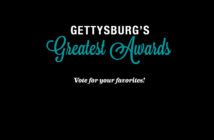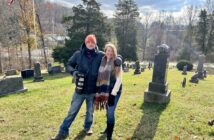Events from Gettysburg’s Past Mold Area Students’ Futures
By Ayleen Gontz | Photography by Casey Martin
Within just 10 sentences of Abraham Lincoln’s “The Gettysburg Address,” Barbara Sanders found inspiration to develop a unique program that challenges youth to reconnect with their past to change their future.
Sanders, an education specialist at Gettysburg National Military Park, and her staff created the “Great Task” Youth Programs in Community Service and Leadership based on Lincoln’s Nov. 19, 1863, message asking Americans to focus on “the great task remaining before us.” The two-and-a-half-day programs run from July to October and are open to school-based and youth-oriented groups that serve late middle school and early high school students.
“A lot of us memorize ‘The Gettysburg Address,’ but we don’t really understand it,” Sanders says. “The charge to the kids in the program, stemming from ‘The Gettysburg Address,’ is to learn here then go back to your communities and find a task where you can affect change.”
Sanders explains that the learning here on the Gettysburg battlefield centers around group-oriented, application-based tasks. The program consists of three parts—two activities completed as a group on the battlefield, a group service project done on the battlefield, and a service project the group performs in its community after the program. The lessons focus on 12 character traits displayed during and after the Battle of Gettysburg that are also relevant for leaders today: discipline, teamwork, courage, integrity, endurance, strategic thinking, overcoming adversity, sound judgment, problem-solving, leadership, duty, and sacrifice.
“The program is not designed to meet any curriculum directives,” Sanders says. “It’s a fun but challenging program that focuses on learning character traits and seeing how those traits fit today’s world.”
The key element that sets this program apart, Sanders says, is the way the students experience the battlefield during the program.
Upon arrival in Gettysburg, the students tour the museum, view the movie about the battle, and visit the cyclorama to get a sense of place. Then, each student is given an identity card featuring a short biography of a person who witnessed or had close ties to the battle and their character traits. The identity card, Sanders says, effectively narrows the students’ experiences on the battlefield to one singular point of view.
That point of view and those character traits become the focus of the group discussions held after the activities on the battlefield.
“So many people these days say our youth are not connected to our history, that they are disconnected from society, that there’s no application for leadership,” Sanders says. “We were inspired by the people who were involved in and affected by the battle, and we want to pass that on to the younger generation.”
For example, after setting up the field hospital and creating an operating table with two saw horses and a barn door at the Weikert Farm on United States Avenue, the students talk about Matilda “Tillie” Pierce, a 15 year old who, without training, became a nurse during the war. They discuss integrity and how Tillie would have treated both Union and Confederate soldiers equally. Then, they explore how integrity might come into play during their service project.
Sanders shares another example: after learning how to load and fire a canon on the 9th Massachusetts battalion line, the students talk about Basil Biggs, a free African-American who made the decision to move his family out of harm’s way, and the endurance he would later need to help to bury the dead left behind after the battle. Endurance can become a key factor in completing a service project that takes more energy and time than a group anticipates.
Julio Ruelas-Manzo, an eighth grader from the Edgar Fahs Smith STEAM Academy in York, took part in the cannon activity. He was tasked with commanding his teammates when to fire the cannon, bringing the traits of leadership and sound judgment into play. “It wasn’t hard to learn [how to fire the cannon],” he says, “but I had to make sure everyone had done their job before I did mine.”
The on-site, short-term service project is a new addition this year to give students the opportunity to participate in a project and discuss it after completion. Sanders says students will be working closely with the Park’s Adopt-A-Position program to build a portion of a Virginia rail fence.
At the end of the program, the students gather at several of the gravesites in the National Cemetery and read letters from the buried soldiers. There, the traits they talk about here are duty, sacrifice, and leadership.
For Majila Eonyi Redman, an eighth grader from the STEAM Academy, the visit to the cemetery was the most memorable moment of the trip. She heard reference to her assigned trait, determination, in many of the words read aloud. “We got to hear what they wrote to their families,” she says. “I liked learning more about the soldiers, what happened to them, and how they had to tell their families about the war.”
The program is now in its second year. Nine groups, including the Boys and Girls Club of Metro Richmond, the New York City Police Athletic League, the Gettysburg Civil Air Patrol, and the Edgar Fahs Smith STEAM Academy of York, participated in 2017. Lodging and meals for the 300-plus students were paid for by an endowment from the Robert H. Smith Family Foundation through the Gettysburg Foundation.
Jan Martin, STEAM Academy coordinator, is impressed with how receptive the students were to the ideals of the program. Upon their return to school, her 24 students developed and completed three service projects: heritage interviews with the residents at Autumn House West and dioramas based on the interviewees’ countries, an indoor carnival of STEAM experiences for foster care families from PA Child, and volunteering at the York Cares Resource Fair.
“The students had to come up with projects that would allow the majority of our school community to participate and interview agencies,” Martin says. “We wanted to hook into the people and agencies that were involved in those areas to execute or extend already great incentives.”
Based on its participation in last year’s program, the STEAM Academy received a $500 grant from the Great Task program to use as seed money for a community service project.
“It’s our way of saying we are serious. We don’t want this relationship and this learning to be done when you leave here,” Sanders says. “The end goal, as in Lincoln’s ‘Gettysburg Address,’ is to start a change, start a movement. Participating in the program is only the beginning.”
The Great Task has a limited number of spots available for groups to participate in the 2018 year. Email
gett_education@nps.gov for an application.
“The Gettysburg Address”
Four score and seven years ago our fathers brought forth on this continent, a new nation, conceived in Liberty, and dedicated to the proposition that all men are created equal.
Now we are engaged in a great civil war, testing whether that nation, or any nation so conceived and so dedicated, can long endure. We are met on a great battlefield of that war. We have come to dedicate a portion of that field, as a final resting place for those who here gave their lives that that nation might live. It is altogether fitting and proper that we should do this. But, in a larger sense, we cannot dedicate—we cannot consecrate—we cannot hallow—this ground. The brave men, living and dead, who struggled here, have consecrated it, far above our poor power to add or detract. The world will little note, nor long remember what we say here, but it can never forget what they did here. It is for us the living, rather, to be dedicated here to the unfinished work which they who fought here have thus far so nobly advanced.
It is rather for us to be here dedicated to the great task remaining before us—that from these honored dead we take increased devotion to that cause for which they gave the last full measure of devotion—that we here highly resolve that these dead shall not have died in vain—that this nation, under God, shall have a new birth of freedom—and that government of the people, by the people, for the people, shall not perish from the earth.
Abraham Lincoln
Nov. 19, 1863




